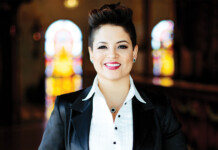 Equality Florida’s Tele-Town Hall Maps Out Litigation Trajectory
Equality Florida’s Tele-Town Hall Maps Out Litigation Trajectory
Equality Florida presented a telephone town hall meeting Monday, February 24, moderated by executive director Nadine Smith. Participating in the call were Shannon Minter, Legal Director for the National Center for Lesbian Rights, and Miami-based LGBT family and estate planning lawyer Elizabeth Schwartz. Also sharing their experiences were two of the six couples who filed a marriage equality lawsuit with Equality Florida: Vanessa and Melanie Alenier; and Don Johnston and Jorge Diaz.
Minter first described the judicial landscape leading up to the filing of the marriage equality lawsuit in Florida. After the Defense of Marriage Act was struck down, there were many judicial victories across the country, finding that many same-sex marriage bans were unconstitutional. From there it was decided to file a lawsuit for Florida couples in state court, challenging the state’s ban on same-sex marriages on federal constitutional grounds. The trajectory outlined by Minter is as follows: a judge will render a verdict in circuit court in Miami-Dade County; then it will be appealed to a district Court of Appeal; and then finally the case will be taken to the Florida Supreme Court.
Schwartz, who was part of the legal team that was successful in having the Florida Supreme Court repeal the ban on gay adoption back in 2010, is hopeful that the Florida courts will read and respect the law to the same letter as so many other courts have across the country, in favor of marriage equality and against discrimination of a certain class of citizens. The panel seemed confident in being able to state the case for equality clearly and passionately, and weren’t worried about what the opposing side would be giving as a rationale to block us from our rights. Both Schwartz and Minter are confident that the state attorney general can’t bring much of anything that hasn’t already been heard to the table, whether it be a defense for “traditional marriage” or that marriage is for parenting only and that heterosexual couples are “the best parents,” a defense out of Utah that Minter was surprised to hear (it did not work).
Melanie Alenier told her story. Her and her partner, Vanessa, have been together for eight years and raise a young son together. Melanie went as far as to change her last name to Vanessa’s in an act of perhaps pseudo-marriage, but she didn’t tie the knot elsewhere because getting married here mattered to her. “I want to get married in Florida because that’s where we’ve grown up our entire lives,” she said. “Our son…asked us about a year ago if we were married and asked us about our wedding. I had to explain to him that we’re not married, which is okay, but he started asking why we’re not married…he realized that all of his friends’ parents are married and all the people that he knows are married, so why aren’t Mommy and Mama married?”
Don Johnston said that the time in which he came out was so different — when he was sixteen years old, in 1985, the actor Rock Hudson was on the covers of national magazines, dying of AIDS, and that was the stigma that being gay carried then. Now, sixteen-year-olds come out and there is a much more accepting atmosphere, one of hope. “That’s a message of hope…to the next generation, that you can have it all,” he said.
Jorge Diaz, brother of former Miami mayor Manny Diaz, picked up where Johnston left off, and said that when he came out, “…the scariest thing about it all was that I wouldn’t be able to get married the way I thought about getting married, in the very traditional sense…that I wouldn’t get to enter politics because I was homosexual…but times have changed, it’s an amazing time [now],” he said, adding that the time in which they and the other couples filed the lawsuit “just feels right.”
Throughout the town hall meeting, Nadine Smith asked interested parties to share their stories of love, commitment and hope at the Get Engaged! website, powered by Equality Florida and Freedom to Marry, at ImEngaged.org. Smith also noted that today, Equality Florida was one of 12 organizations partnering with Southerners for the Freedom to Marry, and that Florida leads the South for protections and rights for LGBT people. Smith also promoted the website “Why Courts Matter,” explaining the importance of the judiciary in the fight for our rights and for the rights of others. You can read more at eqfl.org/whycourtsmatter and at WhyCourtsMatter.org.
We can all work together. You can help Equality Florida by donating your time and story to the “Get Engaged” effort, among others that are important to the LGBT community in our state. Visit eqfl.org for more information.














